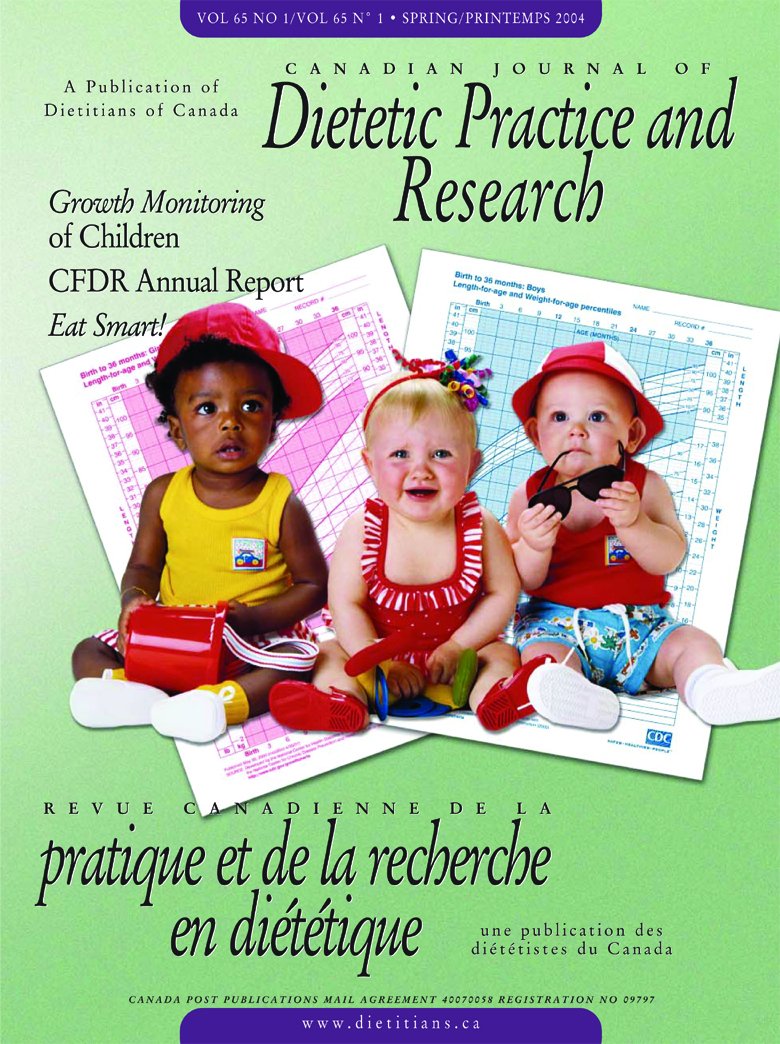Volume 65 • Number 1 • March 2004
Chair’s Message
Editor's Message
Research
Eat Smart! Ontario’s Healthy Restaurant Program is a standard provincial health promotion program. Public health units give an award of excellence to restaurants that meet nutrition, food safety, and non-smoking seating standards. The purpose of this study was to determine why some restaurant operators have not applied to participate in the program, and how to get them to apply. Four focus group interviews were conducted with 35 operators who didn’t apply to participate. The analysis of responses yielded various themes. The participants’ perceived barriers to participation were misunderstandings about how to qualify for the program, lack of time, concern about different non-smoking bylaw requirements, and potential loss of revenue. Their perceived facilitators to participation were convenience of applying to participate, franchise executives’ approval to participate, a 100% non-smoking bylaw, flexibility in the assessment of restaurants, the opportunity for positive advertising, alternative payment for food handler training, and customer demand. Program staff can use the findings to develop and use strategies to encourage participation.
We investigated the impact of the Kids’ Shop Smart® Tour program on participants’ attitudes toward trying new foods and eating a variety of foods, as well as their recognition of Canada’s Food Guide to Healthy Eating. Data were collected from parents/ caregivers, students in kindergarten to grade 3, and teachers; questionnaires, quizzes, and interviews were used. Questionnaires were sent home with 947 students; 52% of parents/caregivers returned completed questionnaires. Many parents/caregivers reported that their children tried and liked unfamiliar foods on the tour. No significant difference was detected in children’s willingness to try new foods or consumption of a greater variety of food before and after the tour. Quiz score differences between participants and a comparison group were not statistically significant. Of the 38 teachers who completed interviews, 97% reported that the program helped them meet curriculum requirements; 95% would recommend the resource to other teachers. Quantitative findings do not indicate that the program increases children’s willingness to try new foods or eat a greater variety of food. However, qualitative data revealed that some parents observed their children trying new foods more willingly and demonstrating greater knowledge of and interest in Canada’s Food Guide to Healthy Eating. Further research with validated measurement tools is recommended to establish the effectiveness of the Kids’ Shop Smart® Tour.
A participatory approach for the prevention of type 2 diabetes for francophone youth of New Brunswick Diabetes, a serious public health problem, is on the rise, claiming millions of victims. A considerable body of research exists on diabetes, but the development of effective primary prevention strategies is just beginning. This article presents the results of a project, based on an innovative approach where health professionals and community groups have come together to address the issue. The purpose of the project is to develop an intervention strategy for the prevention of type 2 diabetes directed at young francophones living in a minority environment in New Brunswick and adapted to their needs. Qualitative data were gathered from two focus groups and submitted for a content analysis. The process was evaluated. The young francophones have identified the school environment as ideal for intervention. According to them, the intervention should be adapted to the age of the youths. For the 5-to-13-year-old group, the intervention should target healthy eating habits and physical activity whereas for the 14-to-18-year-old group, the emphasis should be on preventing diabetes. The youth and the professionals acquired a greater understanding of the problem of diabetes and its prevention. Youth can now proceed to action, with appropriate guidance. The experience and knowledge of the professionals contributed to the development of the strategy. A shortage of dietitians in public health to work in the area of the prevention of diabetes has been noted.
Public Policy Statements
Recent changes to commonly used growth charts, including the addition of charts for body mass index, have raised questions on which growth charts to use for Canadian children and how to apply body mass index in the paediatric population. This statement, developed collaboratively by key organizations in paediatric health care, is intended for use as a practice guideline for medical practitioners and clinical and community health (public health, home health) professionals. The desired outcome is the provision of recommendations that will promote consistent practices in monitoring growth and assessing atypical patterns of linear growth and weight gain in infants, children and adolescents.










